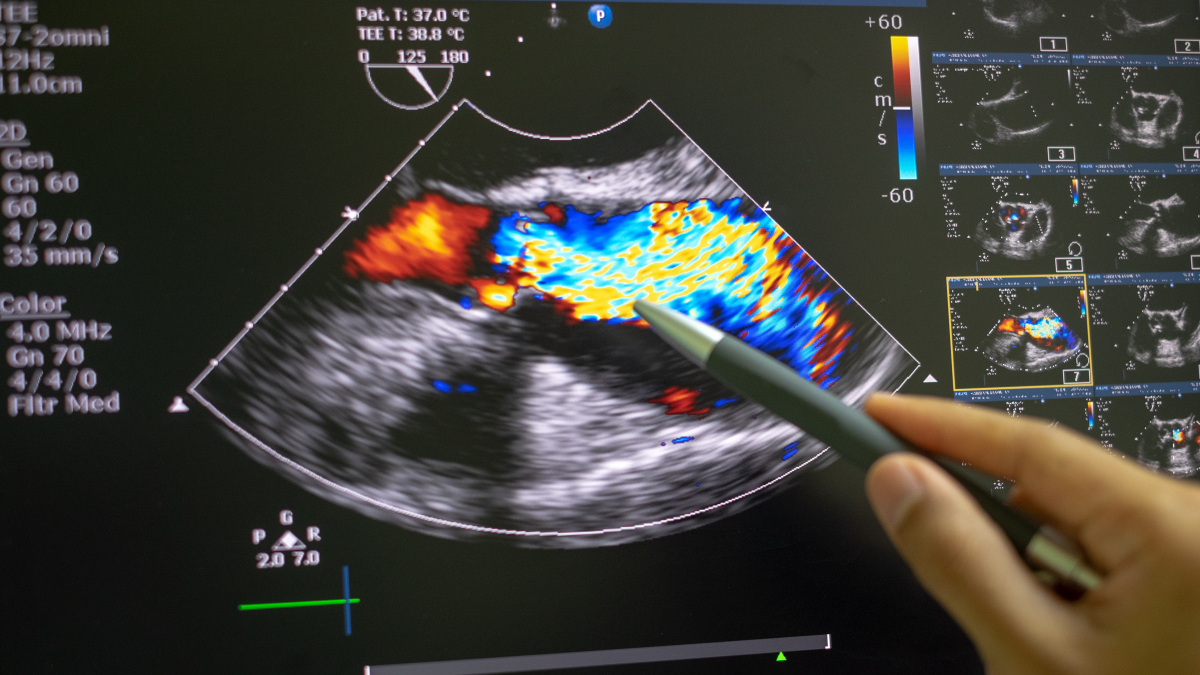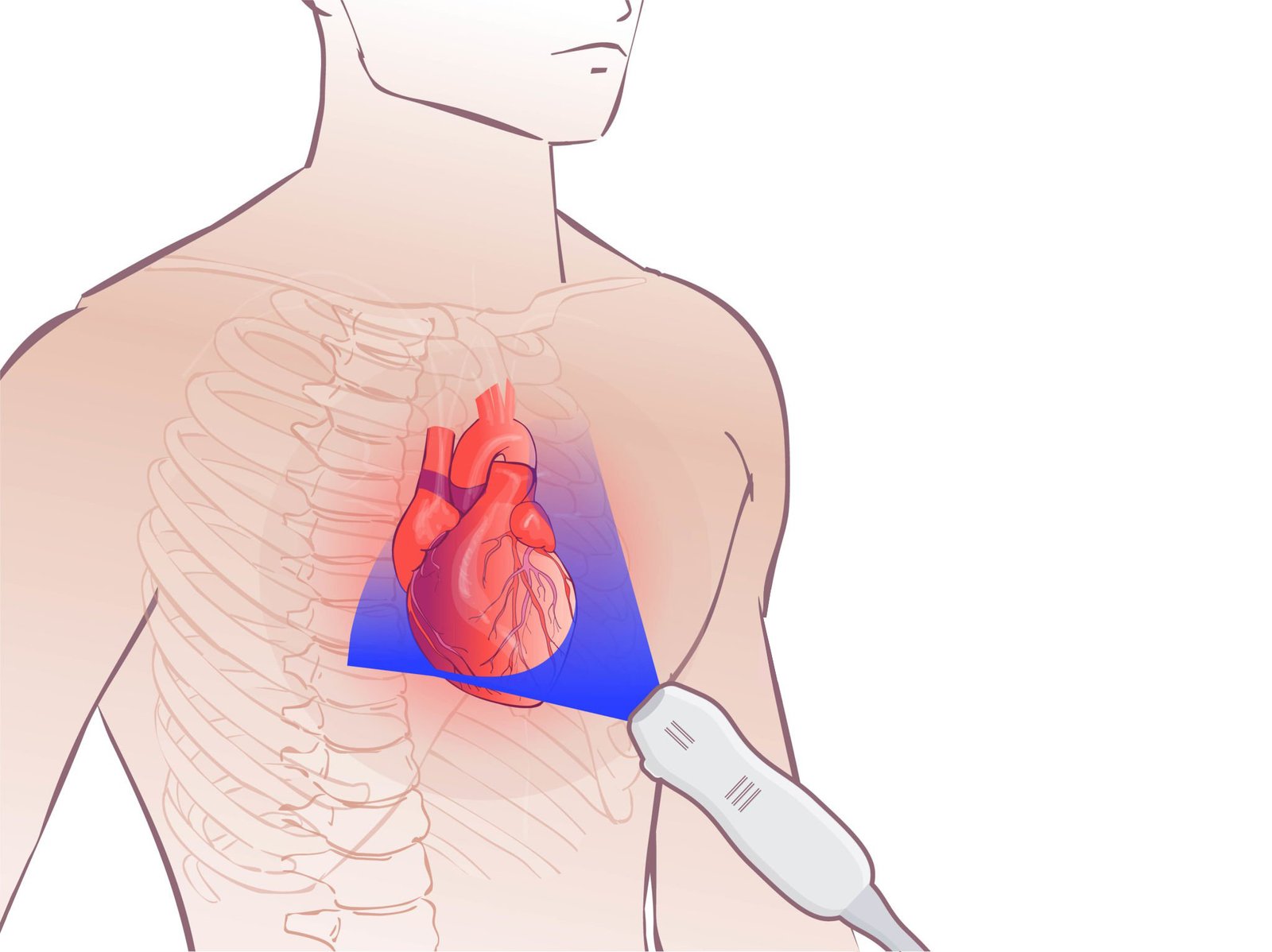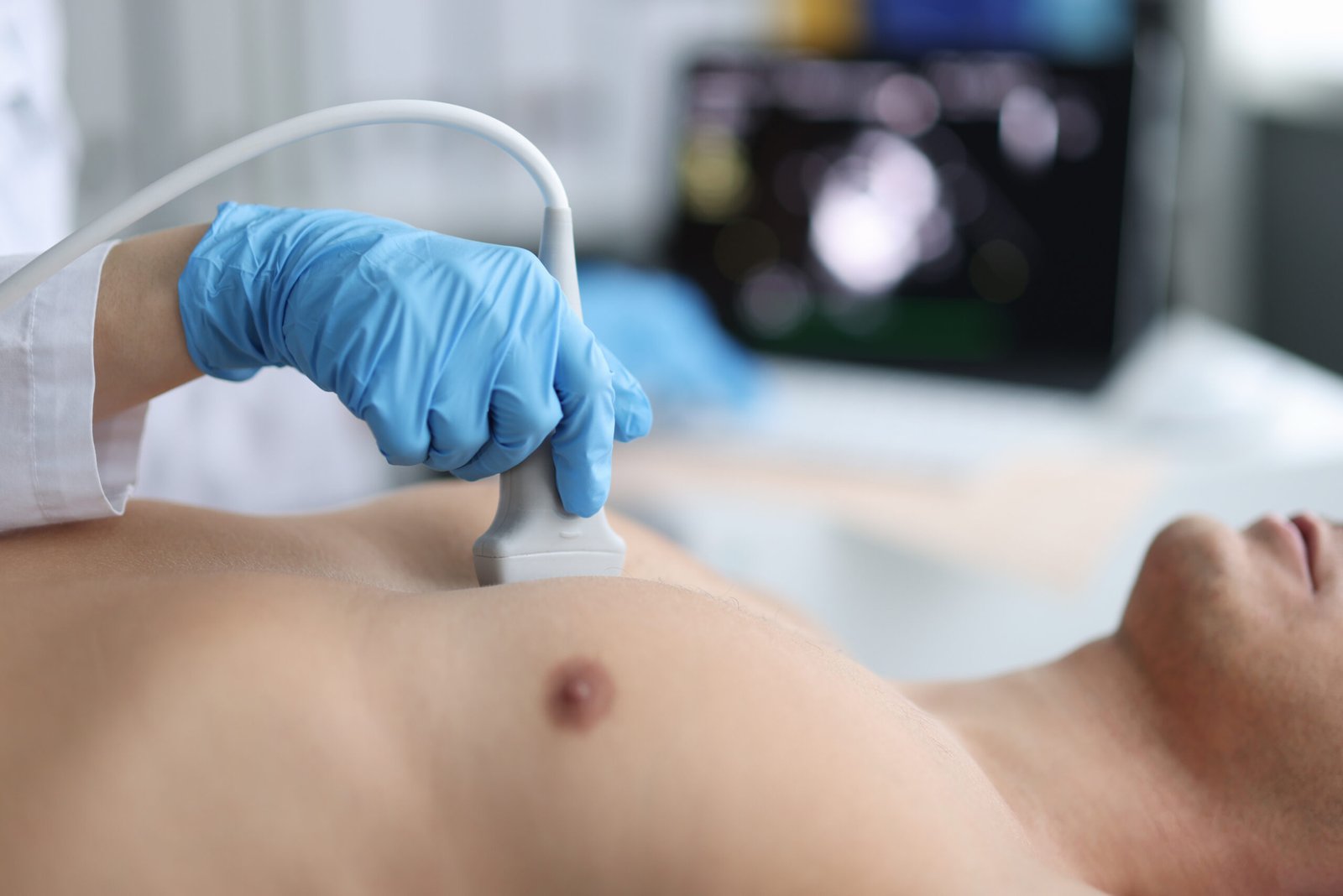
Let’s delve into the fascinating world of cardiac imaging, with a particular focus on echocardiography. This tool is pivotal in diagnosing and managing heart conditions, offering a non-invasive method to gain a clear picture of your heart’s health. Let’s explore what echocardiography is, who needs it, why and when it should be done, and what the process involves.
What is Echocardiography?

Echocardiography, often referred to simply as an “echo,” is a type of ultrasound used to create images of the heart. Unlike X-rays, which use radiation, echocardiography uses sound waves to produce detailed pictures of the heart’s structures, including the chambers, valves, and blood vessels.
During the procedure, a device called a transducer is placed on your chest. The transducer emits sound waves that bounce off the heart’s structures and return to the device. These echoes are then translated into images by a computer, allowing doctors to see the heart in real-time.
This non-invasive, painless and very safe procedure can help detect a wide range of heart problems, from structural abnormalities to issues with how the heart pumps blood. It is a crucial tool in modern cardiology, offering a safe and detailed way to assess heart health.
Who Needs an Echocardiogram?
Echocardiography is an essential diagnostic tool that may be recommended for various reasons. You can get an echocardiogram at Northern Heart Hospital! If you experience any of the following, we suggest you may need an echo:
Individuals with Symptoms of Heart Disease: If you experience symptoms such as chest pain, shortness of breath, palpitations, or unexplained fatigue, your doctor might recommend an echocardiogram. These symptoms can indicate underlying heart conditions, and an echo can help identify the cause.
Patients with Known Heart Conditions: If you have a diagnosed heart condition such as coronary artery disease, heart valve disease, or cardiomyopathy, regular echocardiograms can help monitor the disease’s progression and the effectiveness of treatment.
People with a High Risk of Heart Disease: Those with risk factors for heart disease – such as high blood pressure, diabetes, or a family history of heart problems – might need an echocardiogram to assess their heart’s condition, even if they have not yet experienced symptoms.
Before or After Heart Surgery: Echocardiography is often used to evaluate the heart’s condition before surgery or to monitor recovery and heart function after surgery.
Who Needs an Echocardiogram?
Echocardiography is an essential diagnostic tool that may be recommended for various reasons. You can get an echocardiogram at Northern Heart Hospital! If you experience any of the following, we suggest you may need an echo:
- Individuals with Symptoms of Heart Disease: If you experience symptoms such as chest pain, shortness of breath, palpitations, or unexplained fatigue, your doctor might recommend an echocardiogram. These symptoms can indicate underlying heart conditions, and an echo can help identify the cause.
- Patients with Known Heart Conditions: If you have a diagnosed heart condition such as coronary artery disease, heart valve disease, or cardiomyopathy, regular echocardiograms can help monitor the disease’s progression and the effectiveness of treatment.
- People with a High Risk of Heart Disease: Those with risk factors for heart disease – such as high blood pressure, diabetes, or a family history of heart problems – might need an echocardiogram to assess their heart’s condition, even if they have not yet experienced symptoms.
- Before or After Heart Surgery: Echocardiography is often used to evaluate the heart’s condition before surgery or to monitor recovery and heart function after surgery.
Why is Echocardiography Important?
Echocardiography is crucial because it provides a comprehensive view of the heart’s structure and function. Here’s why we would recommend it:
- Diagnosing Heart Conditions: An echocardiogram can reveal a wide range of heart issues, including congenital heart defects, valve problems, and issues with the heart’s chambers or walls. Early diagnosis is key to managing these conditions effectively.
- Assessing Heart Function: It helps in evaluating how well your heart is pumping blood, which is essential for diagnosing conditions like heart failure. It can also measure the size and shape of the heart, providing critical information about its health.
- Guiding Treatment: The detailed images from an echo can guide your doctors in choosing the best treatment plan. For example, if a heart valve is not functioning properly, the echo can help determine whether medication or surgery is the best course of action.
- Monitoring Progress: For those already diagnosed with heart disease, echocardiography is invaluable in monitoring the effectiveness of treatments, whether they involve medication, lifestyle changes, or surgical interventions.
When Should You Get an Echocardiogram?
Wondering if you or a loved one should get an echocardiogram? This largely depends on your symptoms, medical history, and risk factors. Here are some scenarios when an echocardiogram might be necessary:
- When symptoms arise: If you develop symptoms such as chest pain, breathlessness, or palpitations, it is essential to consult your doctor immediately. They may recommend an echocardiogram to diagnose the problem.
- During routine check-ups for high-risk individuals: If you have risk factors for heart disease, such as hypertension or diabetes, your doctor might include echocardiography as part of your regular health check-ups.
- Before major surgery: Before undergoing major surgery, especially non-cardiac surgery, an echocardiogram might be necessary to ensure your heart is in good condition.
- Regular monitoring for heart disease patients: For those with existing heart conditions, regular echocardiograms might be scheduled to monitor the heart’s function and the effectiveness of treatment.
How is the Process Done?

Understanding the echocardiography process can help ease any concerns you might have. Here’s a step-by-step look at what you can expect before, during, and after the procedure.
Before the Procedure
There is not much you need to do to prepare for an echocardiogram. It’s a non-invasive procedure that doesn’t require fasting or stopping medications in most cases. However, if you’re undergoing a stress echocardiogram, where your heart is tested under physical stress (like exercise), your doctor might give you specific instructions.
It’s important to wear comfortable clothing, as you may need to change into a hospital gown. If you’re taking any medications, bring a list with you to share with the medical team.
During the Procedure
When you arrive for the echocardiogram, you will be asked to lie down on an examination table. The technician will apply a special gel to your chest. This gel helps the transducer make better contact with your skin, ensuring clear images.
The transducer is then moved across your chest to capture different angles of the heart. You might hear sounds during the procedure, such as your heartbeat or whooshing noises, which is normal. The technician might ask you to change positions or hold your breath at times to get clearer images.
If you’re undergoing a stress echocardiogram, you’ll either exercise on a treadmill or be given medication to make your heart work harder, simulating the effects of exercise. The echocardiogram is performed while your heart is under stress to see how it copes.
The procedure typically takes 30 to 60 minutes. It’s painless, though you might feel slight pressure from the transducer.
After the Procedure
Once the echocardiogram is complete, the technician will clean off the gel, and you can return to your normal activities immediately. There is no recovery time needed.
Your doctor will review the images and discuss the results with you during a follow-up appointment. Depending on the findings, further testing or treatment might be recommended.
Conclusion
Echocardiography is a powerful tool in cardiology, offering a clear, non-invasive and extremely safe method to assess heart health. Whether you’re experiencing symptoms of heart disease, managing a known condition, or simply taking proactive steps to ensure your heart is healthy, an echocardiogram with Northern Heart Hospital can provide valuable insights.
At Northern Heart Hospital, we are dedicated to helping you keep your heart in top shape. If you think you might need an echocardiogram or have any questions about your heart health, do not hesitate to reach out to our expert team. Remember, your heart is at the core of your wellbeing – let’s keep it beating strong!
References:
- American Heart Association (AHA)
- Mayo Clinic
- National Health Service (NHS)
- Johns Hopkins Medicine
- British Heart Foundation (BHF)
